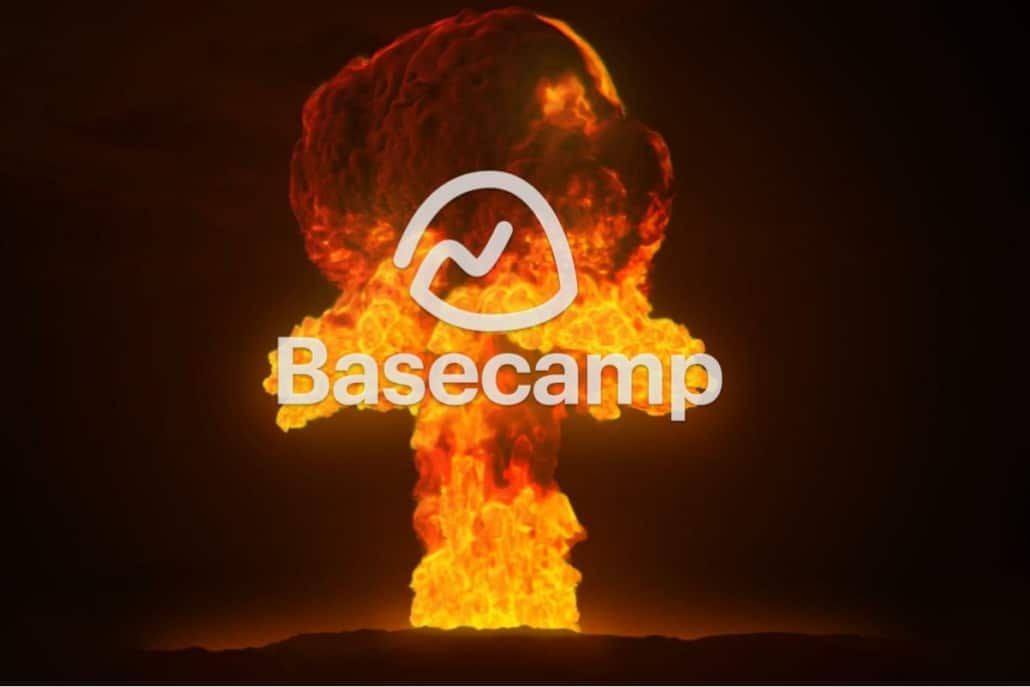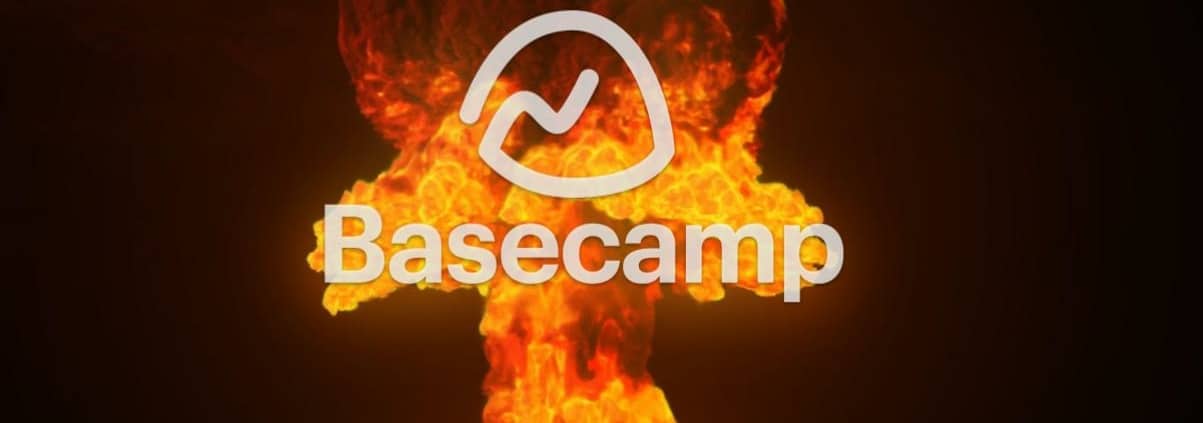Why a Basecamp Founder’s Blog Post Blew the Company Up

In 2018, Jason Fried and David Heinemeier Hansson, the founders of Basecamp, published a book on workplace culture. On the cover, a big red X crosses out a list of ostensibly undesirable traits of job life, things like “80-hour work weeks,” “endless meetings,” “no time to think” and, lastly, “chat’s blowing up.” Scrawled underneath this X-ed-out list is the book’s title, worded, reassuringly, It Doesn’t Have to Be Crazy at Work. It’s one of several, among them a New York Times bestseller, coming from the leaders of a company that makes project management and communication software. A promotional page for It Doesn’t Have to Be Crazy at Work states, “Over the last 18 years we’ve been working at making Basecamp a calm company.” “Are there occasionally stressful moments?” it goes on to say. “Sure — such is life. Is every day peachy? Of course not — we’d be lying if we said it was.” The book, Fried and Hansson say, “points out the diseases plaguing modern workplace and work methods.” They say they have a “prescription to make it better.”
Part of me can’t help but find this amusing after having followed the coverage of Basecamp’s recent workplace turmoil and dysfunction, which culminated in a third of its workforce bailing. Sure, maybe it doesn’t have to be crazy at work. But for Basecamp, it has been. “Last week was terrible,” Fried wrote in a recent blog post. “We started with policy changes that felt simple, reasonable, and principled, and it blew things up culturally in ways we never anticipated. David and I completely own the consequences, and we’re sorry. We have a lot to learn and reflect on, and we will.” Indeed. Whatever remedy Fried and Hansson recommended in their book for keeping things “calm” seems to have failed utterly. Back to square one, fellas.
An answer about what to do, culturally, can’t be derived in advance of careful study.
What ignited the Basecamp imbroglio, according to reporting in The Verge, weren’t “reasonable” policy changes but rather an attempt at suppressing an internal Basecamp discussion about an indecent, long-standing company practice—the maintenance of a list of “funny” Basecamp customer names representing a variety of ethnic groups. “Employees,” according to The Verge, “considered their inclusion inappropriate at best and racist at worst.”
The founders were well aware of the list’s existence for years but did nothing, despite feeling it “wrong in all sorts of fundamental ways,” as Hansson said. An employee suggested that such behavior laid the foundation for hate crimes and genocide (a link to the Anti-Defamation League’s “pyramid of hate” was shared), and Hansson dismissed this point as an instance of “catastrophizing,” a clinical-psychological term for a tendency to inflate harms or threats beyond reason. Employees would later file an HR complaint against Hansson for, in an internal post, singling out a worker who said the list dehumanizes people, by showing that that worker had once, apparently hypocritically, joined in on a discussion about a funny customer name. Basecamp’s HR didn’t find anything objectionable about Hansson’s note and, about two weeks later, Fried posted his blog announcing, among other things, the “principled” policy of banning socio-political discussion on the company’s internal forums. Hansson followed that up saying anyone who doesn’t like the new direction can leave with a severance package.
An idea that may help understand the derailing of Basecamp’s culture is the “normalization of deviance.” Coined by sociologist Diane Vaughan, after she reviewed NASA’s Challenger disaster (a result of officials ignoring dangers associated with a space shuttle component), the term is now finding its way into the medical literature, specifically the Journal of Patient Safety. “Vaughan describes this phenomenon as occurring when people within an organization become so insensitive to deviant practice that it no longer feels wrong,” the authors of a 2018 paper wrote. “Insensitivity occurs insidiously and sometimes over years because disaster does not happen until other critical factors line up.”
At Basecamp, line up they did. Seemingly emboldened by cryptocurrency company Coinbase’s move, last year, to depoliticize its workplace, Basecamp sought to transcend the messy, fraught political discussions—particularly about racism—that surround all of us with the quick fix of stifling speech on those topics in their chat forums. Hansson’s reasoning on this point is worth considering:
I’ve read some opinions on all of this that charge that facilitating these kinds of discussions, however acrimonious or uncomfortable or unresolved, is actually good, because a lot of life right now is acrimonious, uncomfortable, and unresolved, so work should reflect that. I can’t get behind those arguments…[A]ll of that, inasmuch as it does not directly relate to the business, is already so much of everyone’s lives all the time on Twitter, Facebook, or wherever. Demanding that it also has to play out in our shared workspaces isn’t going to lead anywhere good, in my opinion.
That may very well be true. As philosophers like to say, “It’s an empirical question.” An answer about what to do, culturally, can’t be derived in advance of careful study. What seems clear, though, is that disinterested, dispassionate conversations in chat forums about political issues of the day is near-impossible, because such issues—like whether the United States today has a white supremacist culture that permeates Basecamp itself, as one worker claimed—have, or are felt to have, personal stakes for employees. Animating this to some extent is a victimhood mentality. “The key idea,” psychologist Jonathan Haidt has said, “is that the new moral culture of victimhood fosters ‘moral dependence’ and an atrophying of the ability to handle small interpersonal matters on one’s own. At the same time that it weakens individuals, it creates a society of constant and intense moral conflict as people compete for status as victims or as defenders of victims.”
Subscribe to the Ethical Systems newsletter
For example, an all-hands meeting at Basecamp left some employees in tears, according to The Verge. In it, Fried didn’t press another senior employee, Ryan Singer, to acknowledge the existence of white supremacy at the company after Singer doubted that white people have implicit racial biases and suggested it was a form of racism to claim as much. “The fact that you can be a white male, and come to this meeting and call people racist and say ‘white supremacy doesn’t exist’ when it’s blatant at this company is white privilege,” a Black employee said during the meeting in response to Singer. “The fact that he wasn’t corrected and was in fact thanked—it makes me sick.”
I emphasized “corrected” because that word, I think, highlights what is now obvious—that many people feel this is no matter of opinion. There is, apparently, no “room for disagreement,” as we say. So it’s no surprise that, when you take a disagreement about these weighty topics personally, you feel unable to collaborate with a coworker. Singer, who has now left the company, told The Verge, “White supremacism exists, and America’s history of racism still presents terrible problems, but I don’t agree that we should label our entire culture with this ideology.”
If companies are going to avoid a Basecamp-style cultural meltdown, it’ll be because they support employees who want to genuinely and respectfully argue over views like Singer’s, rather than demand that an official position be adopted or impose a rule that no one is allowed to talk about it.
And perhaps the best way to do that is to harness the better angels of our face-to-face nature. In March, a Utah-based company that was experiencing heated discussions like at Basecamp, on its internal Slack, decided on a new policy, according to The Wall Street Journal: “employees who want to post a link to the company Slack must first make a video explaining their thoughts about the link; anyone who wants to respond must record a video of their own.” On Slack, “people were much sharper in their tone,” CEO Benton Crane told the paper. “They were less empathetic of who they were communicating with.” It’s still too early to say this is a perfect solution, but, as Crane said, the policy has “almost had the effect of a ban but without the negative baggage that comes along with a ban of people feeling like their voice is being stifled.”
That’s an experiment worth having.
Brian Gallagher is the Communications Director at Ethical Systems. Follow him on Twitter @bsgallagher.
Lead image: Toggl







